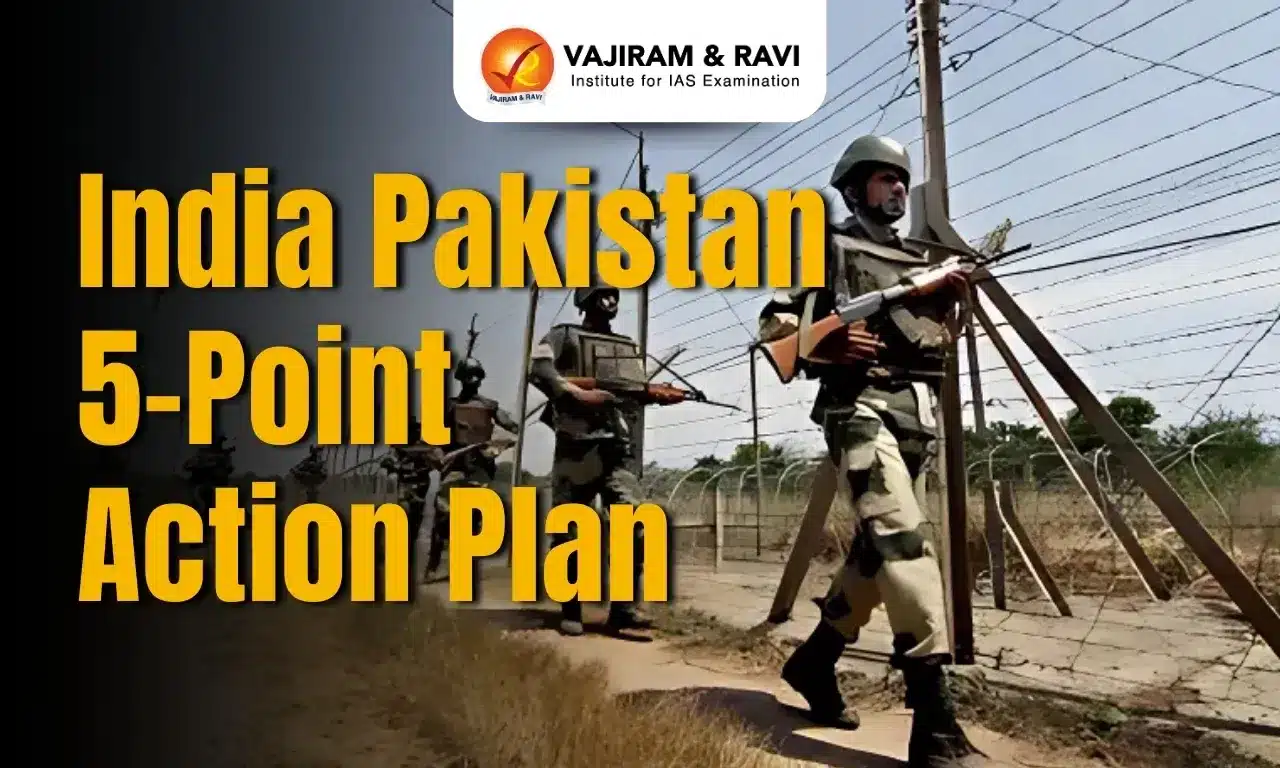What’s in Today’s Article?
- India Pakistan 5-Point Action Plan Latest News
- India’s Response to the Pahalgam Terror Attack
- Geopolitical Isolation of Pakistan
- Perception in Islamabad: India is Taking Advantage
- The Pahalgam Attack: Pakistan’s Desperate Gambit
- India’s Strategic Path Forward
- Conclusion: Focus on Kashmir’s Development
- India Pakistan 5-Point Action Plan FAQs
India Pakistan 5-Point Action Plan Latest News
- The Cabinet Committee on Security (CCS), India’s top national security body, has taken strict measures against Pakistan after finding cross-border links in a terror attack in Pahalgam, Jammu and Kashmir, which killed 26 people.
- In response, India has launched a 5-point action plan targeting Pakistan’s infrastructure, diplomatic presence, and cross-border movement.
India’s Response to the Pahalgam Terror Attack
- Suspension of Indus Waters Treaty
- India has suspended the Indus Waters Treaty with Pakistan, which governs river water sharing, until Pakistan stops supporting cross-border terrorism.
- This marks a major diplomatic shift since the treaty was signed in 1960.
- Closure of Attari-Wagah Border Check Post
- India has closed the Attari Integrated Check Post, halting all cross-border movement of people and goods.
- Those already in India with valid documents may return by 01 May 2025.
- Cancellation of SAARC Visa Exemption Scheme (SVES)
- India has suspended the SAARC Visa Exemption Scheme for Pakistani nationals.
- All existing SVES visas are cancelled, and Pakistani nationals in India under the scheme must leave within 48 hours.
- Expulsion of Pakistani Military Advisors
- India has expelled all Pakistani military, naval, and air advisors from the Pakistani High Commission in New Delhi, declaring them Persona Non Grata.
- Indian military advisors in Islamabad will also be withdrawn.
- Reduction of Diplomatic Personnel
- India will reduce its diplomatic staff in Pakistan from 55 to 30 by 01 May 2025, significantly scaling down bilateral diplomatic engagement.
Geopolitical Isolation of Pakistan
- Loss of US Leverage
- Post-US withdrawal from Afghanistan in 2021, Pakistan lost strategic importance.
- The US no longer provides economic support, unlike in previous years.
- Declining Gulf Support
- Gulf nations have refused financial aid, showing frustration with Pakistan’s lack of reciprocity and repeated bailouts.
- Strained China Relations
- Despite China’s major investments under the Belt and Road Initiative, projects are stalled due to:
- Corruption
- Insecurity, including attacks on Chinese personnel
- China’s trust and enthusiasm for Pakistan have declined.
- Despite China’s major investments under the Belt and Road Initiative, projects are stalled due to:
- Afghanistan Turns Hostile
- Taliban-ruled Afghanistan, once expected to offer Pakistan “strategic depth”, has become a security threat.
- Increased attacks along the Afghan-Pakistan border.
- Tensions with Iran
- Baloch militants killed Pakistani workers in Iran recently.
- Both countries have engaged in cross-border strikes targeting militant camps.
Perception in Islamabad: India is Taking Advantage
- Pakistan sees India’s growing confidence and regional assertiveness as an attempt to marginalise and isolate it.
- India now treats Pakistan as irrelevant, especially in its Kashmir policy, evidenced by the abrogation of Article 370 in 2019.
- Record tourism in Kashmir and economic improvements signal stability, reinforcing India’s narrative of normalcy.
- US “de-hyphenation” of its relations (treating India and Pakistan separately) underscores Pakistan’s diminished relevance.
- PM Modi’s visit to Saudi Arabia and US VP J.D. Vance’s visit to India, while skipping Pakistan, highlight its geopolitical isolation.
The Pahalgam Attack: Pakistan’s Desperate Gambit
- Seen as a calculated provocation to signal that Pakistan still matters in regional geopolitics.
- Army Chief General Asim Munir’s rhetoric on the “two-nation theory” and Kashmir being the “jugular vein” lays the ideological groundwork.
- The timing of the attack coinciding with global diplomatic engagements suggests a message to the world: Pakistan remains a critical regional actor.
- Even negative global attention, Pakistan hopes, could result in renewed engagement, breaking its current isolation.
India’s Strategic Path Forward
- Immediate Internal Response
- Conduct a security audit to identify lapses.
- Avoid politicisation; involve elected state government (e.g., National Conference) in stabilisation efforts.
- Ensure that tourism and development in Kashmir are not derailed.
- Diplomatic Strategy
- Maintain pressure to keep Pakistan diplomatically isolated.
- Prevent international actors from seeing terror as a valid means to draw engagement.
Conclusion: Focus on Kashmir’s Development
- India’s long-term approach should centre on the people of Kashmir. The Pahalgam attack must not reverse the progress towards stability and prosperity in the region.
- India must strike a balance between strategic assertiveness and pragmatic engagement.
India Pakistan 5-Point Action Plan FAQs
Q1. What triggered India’s 5-point action plan against Pakistan?
Ans. The terror attack in Pahalgam, Jammu and Kashmir, which killed 26 people, prompted India’s strict response.
Q2. What are the key actions India took after the Pahalgam attack?
Ans. India suspended the Indus Treaty, closed borders, cancelled visas, expelled advisors, and reduced diplomatic staff.
Q3. Why is the Indus Waters Treaty suspension significant?
Ans. It marks the first time India suspended the 1960 treaty, using water diplomacy as a pressure tactic.
Q4. How is Pakistan diplomatically isolated regionally?
Ans. Pakistan faces reduced US leverage, Gulf disinterest, strained ties with China, Iran, and a hostile Afghanistan.
Q5. What is India’s long-term strategy post-attack?
Ans. India focuses on Kashmir’s development while diplomatically isolating Pakistan and avoiding escalation or politicisation of the issue.
Last updated on June, 2025
→ UPSC Notification 2025 was released on 22nd January 2025.
→ UPSC Prelims Result 2025 is out now for the CSE held on 25 May 2025.
→ UPSC Prelims Question Paper 2025 and Unofficial Prelims Answer Key 2025 are available now.
→ UPSC Calendar 2026 is released on 15th May, 2025.
→ The UPSC Vacancy 2025 were released 1129, out of which 979 were for UPSC CSE and remaining 150 are for UPSC IFoS.
→ UPSC Mains 2025 will be conducted on 22nd August 2025.
→ UPSC Prelims 2026 will be conducted on 24th May, 2026 & UPSC Mains 2026 will be conducted on 21st August 2026.
→ The UPSC Selection Process is of 3 stages-Prelims, Mains and Interview.
→ UPSC Result 2024 is released with latest UPSC Marksheet 2024. Check Now!
→ UPSC Toppers List 2024 is released now. Shakti Dubey is UPSC AIR 1 2024 Topper.
→ Also check Best IAS Coaching in Delhi
























